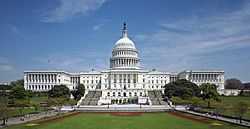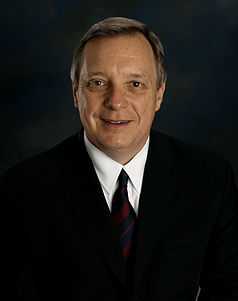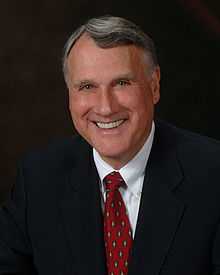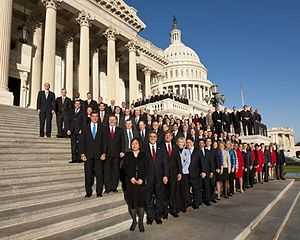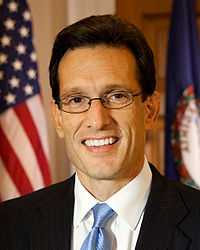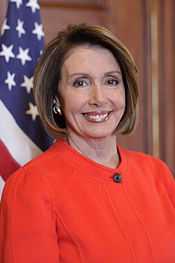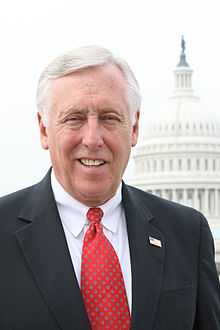112th United States Congress
| 112th United States Congress | |||||||||||||||||||||||||||||
| |||||||||||||||||||||||||||||
The One Hundred Twelfth United States Congress was the meeting of the legislative branch of the United States federal government, from January 3, 2011 until January 3, 2013. It convened in Washington, D.C. on January 3, 2011, and ended on January 3, 2013, 17 days before the end of the presidential term to which Barack Obama was elected in 2008. Senators elected to regular terms in 2006 completed those terms in this Congress. This Congress included the last House of Representatives elected from congressional districts that were apportioned based on the 2000 census.
In the 2010 midterm elections, the Republican Party won the majority in the House of Representatives. While the Democrats kept their Senate majority, it was reduced from the previous Congress.[3] This was the first Congress in which the House and Senate were controlled by different parties since the 107th Congress (2001–2003), and the first Congress to begin that way since the 99th Congress (1985–1987). In this Congress, the House of Representatives had the largest number of Republican members, 242, since the 80th Congress (1947–1949).[4] It was also the first Congress since 1947 in which no member of the Kennedy family served, as well as the most politically polarized Congress since Reconstruction, with record low approval ratings.[5]
Major events
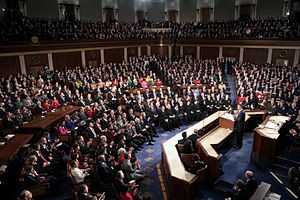

- January 6, 2011: On the second day of the 112th Congress, the House of Representatives read a modified version of the U.S. Constitution, a first.[6]
- January 8, 2011: 2011 Tucson shooting: Representative Gabrielle Giffords and nineteen other people were shot by a gunman in Tucson, Arizona. Six of them, including a federal judge and a congressional aide, died. Votes on the House floor were suspended for one week.
- January 25, 2011: 2011 State of the Union Address
- March 19, 2011: The United States initiated Operation Odyssey Dawn as part of the international military intervention in the Libyan Civil War.[7] The intervention continued under the auspices of NATO as Operation Unified Protector until the end of military operations in October 2011.
- May 2, 2011: Navy Seals killed al-Qaeda leader Osama Bin Laden in Operation Neptune Spear.
- April 9, 2011: A last-minute deal between both parties averts a partial shutdown of the federal government.
- August 2, 2011: The 2011 debt-ceiling crisis ends with the Budget Control Act of 2011.
- December 18, 2011: The United States completed its withdrawal of troops from Iraq, formally ending the Iraq War.[8]
- January 24, 2012: 2012 State of the Union Address
- June 28, 2012: In National Federation of Independent Business v. Sebelius, the Supreme Court upheld the Affordable Care Act's constitutionality but found the expansion of Medicaid unconstitutionally coercive on the states.
- November 6, 2012: 2012 general elections, including:
- United States House of Representatives elections, 2012, in which Democrats gained eight seats, but not enough to retake the majority
- United States Senate elections, 2012, in which Democrats gained two seats in their majority
- United States presidential election, 2012, in which Barack Obama was re-elected to a second term
- December 14, 2012: The Sandy Hook Elementary School shooting leaves 28 dead, and prompts debate on gun control in the United States.[9]
- January 1, 2013: United States fiscal cliff avoided. (See American Taxpayer Relief Act of 2012)
Potential government shutdown
| Wikinews has related news: US government shutdown averted in last-minute deal |
A failure to pass a 2011 federal budget nearly led to a shutdown of non-essential government services on April 9, 2011, with the furlough of 800,000 government employees appearing imminent.[10] President Obama met Senate Majority Leader Harry Reid and House Speaker John Boehner in the days preceding the deadline but was unable to come to an agreement to pass a budget. A one-week budget was proposed to avoid a government shutdown and allow more time for negotiations; however, proposals from both parties could not be accommodated. Obama said he would veto a proposed Republican budget over Republican social spending cuts. This was also backed by Senate Democrats who objected to such cuts as that of Planned Parenthood.[11][12][13] However, an agreement was reached between the two parties for a one-week budget to allow for more time to negotiate after Republicans dropped their stance on the Planned Parenthood issue.[12] The two parties ultimately agreed on a 2011 federal budget the following week.
There were many reactions to the possible shutdown with some saying the economy could be hurt during a fragile recovery[14] and others saying the lack of an unnecessary bureaucracy would not be noticed.[15] There was also criticism that while senators and representatives would continue to get paid others such as the police and military personnel would either not be paid for their work or have their payments deferred.[16]
Debt limit crisis
| Wikinews has related news: US President Obama announces deal reached to avert government default |
On August 2, 2011, the United States public debt was projected to reach its statutory maximum. Without an increase in that limit the U.S. Treasury would be unable to borrow money to pay its bills. Although previous statutory increases have been routine, conservative members of the House refused to allow an increase without drastically reducing government spending. Over several weeks and months, negotiators from both parties, both houses, and the White House worked to forge a compromise. The compromise bill, the Budget Control Act of 2011, was enacted on August 2.
Major legislation
Enacted
- April 15, 2011: 2011 United States federal budget (as Department of Defense and Full-Year Continuing Appropriations Act, 2011), Pub.L. 112–10
- August 2, 2011: Budget Control Act of 2011, Pub.L. 112–25
- September 16, 2011: Leahy-Smith America Invents Act, Pub.L. 112–29
- October 21, 2011: United States-Korea Free Trade Agreement Implementation Act, Pub.L. 112–41
- October 21, 2011: United States-Colombia Trade Promotion Agreement Implementation Act, Pub.L. 112–42
- October 21, 2011: United States-Panama Trade Promotion Agreement Implementation Act, Pub.L. 112–43
- December 31, 2011: National Defense Authorization Act for Fiscal Year 2012, Pub.L. 112–81
- February 22, 2012: Middle Class Tax Relief and Job Creation Act of 2012, Pub.L. 112–96
- March 8, 2012: Federal Restricted Buildings and Grounds Improvement Act of 2011, Pub.L. 112–98
- April 4, 2012: Stop Trading on Congressional Knowledge Act of 2012 (STOCK Act), Pub.L. 112–105
- April 5, 2012: Jumpstart Our Business Startups Act (JOBS Act), Pub.L. 112–106
- July 6, 2012: Moving Ahead for Progress in the 21st Century Act (MAP-21 Act), Pub.L. 112–141
- September 28, 2012: Continuing Appropriations Resolution, 2013, Pub.L. 112–175
- November 27, 2012: Whistleblower Protection Enhancement Act of 2012, Pub.L. 112–199
- January 2, 2013: American Taxpayer Relief Act of 2012, Pub.L. 112–240
Proposed
- American Jobs Act, S. 1549
- Cut, Cap and Balance Act, H.R. 2560
- Federal Reserve Transparency Act, S. 202, H.R. 459
- No Taxpayer Funding for Abortion Act, H.R. 3
- PROTECT IP Act, S. 968
- Protect Life Act, H.R. 358
- Repealing the Job-Killing Health Care Law Act, H.R. 2
- Respect for Marriage Act, S. 598, H.R. 1116
- Stop Online Piracy Act, H.R. 3261
- See also: Active Legislation, 112th Congress, via senate.gov
Party summary
- Resignations and new members are discussed in the "Changes in membership" section, below.
Senate

| Party (Shading indicates majority caucus) |
Total | Vacant | |||
|---|---|---|---|---|---|
| Democratic | Independent | Republican | |||
| End of previous Congress | 56 | 2 | 42 | 100 | 0 |
| Begin | 51 | 2 | 47 | 100 | 0 |
| May 3, 2011 | 46 | 99 | 1 | ||
| May 9, 2011 | 47 | 100 | 0 | ||
| December 17, 2012 | 50 | 99 | 1 | ||
| December 26, 2012 | 51 | 100 | 0 | ||
| January 1, 2013 | 46 | 99 | 1 | ||
| January 2, 2013 | 47 | 100 | 0 | ||
| Latest voting share | 53% | 47% | |||
| Beginning of the next Congress | 53 | 2 | 45 | 100 | 0 |
House of Representatives
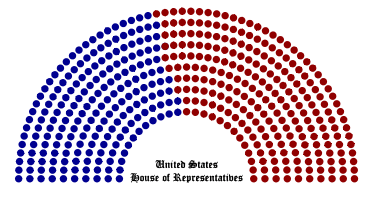
| Party (Shading indicates majority caucus) |
Total | Vacant | |||
|---|---|---|---|---|---|
| Democratic | Republican | ||||
| End of previous Congress | 255 | 179 | 434 | 1 | |
| Begin | 193 | 242 | 435 | 0 | |
| February 9, 2011 | 241 | 434 | 1 | ||
| February 28, 2011 | 192 | 433 | 2 | ||
| May 9, 2011 | 240 | 432 | 3 | ||
| May 24, 2011 | 193 | 433 | 2 | ||
| June 21, 2011 | 192 | 432 | 3 | ||
| July 12, 2011 | 193 | 433 | 2 | ||
| August 3, 2011 | 192 | 432 | 3 | ||
| September 13, 2011 | 242 | 434 | 1 | ||
| January 25, 2012 | 191 | 433 | 2 | ||
| January 31, 2012 | 192 | 434 | 1 | ||
| March 6, 2012 | 191 | 433 | 2 | ||
| March 20, 2012 | 190 | 432 | 3 | ||
| June 12, 2012 | 191 | 433 | 2 | ||
| July 7, 2012 | 241 | 432 | 3 | ||
| July 31, 2012 | 240 | 431 | 4 | ||
| August 15, 2012 | 190 | 430 | 5 | ||
| November 6, 2012 | 193 | 241 | 434 | 1 | |
| November 21, 2012 | 192 | 433 | 2 | ||
| December 3, 2012 | 191 | 432 | 3 | ||
| January 2, 2013 | 240 | 431 | 4 | ||
| Latest voting share | 44.3% | 55.7% | |||
| Non-voting members | 6 | 0 | 6 | 0 | |
| Beginning of next Congress | 200 | 233 | 433 | 2 | |
Leadership
[ Section contents: Senate: Majority (D), Minority (R) • House: Majority (R), Minority (D) ]
Senate
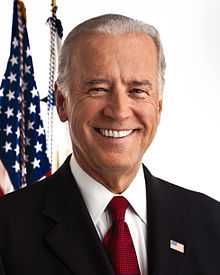
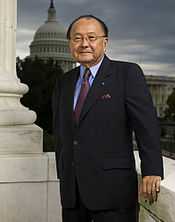
(until December 17, 2012)
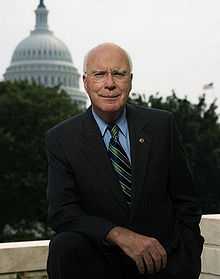
(from December 17, 2012)
- President: Joe Biden (D)
- President pro tempore:
- Daniel Inouye (D), until December 17, 2012
- Patrick Leahy (D), from December 17, 2012
Majority (Democratic) leadership
- Majority Leader and Caucus Chair: Harry Reid
- Assistant Majority Leader (Majority Whip): Dick Durbin
- Caucus Vice Chair and Policy Committee Chair: Chuck Schumer[17]
- Senatorial Campaign Committee Chair and Caucus Secretary: Patty Murray[18][19]
- Policy Committee Vice Chair: Debbie Stabenow[19]
- Steering and Outreach Committee Chair: Mark Begich[19]
- Steering and Outreach Committee Vice Chair: Daniel Akaka
- Chief Deputy Whip: Barbara Boxer
Minority (Republican) leadership
- Minority Leader: Mitch McConnell
- Assistant Minority Leader (Minority Whip): Jon Kyl
- Conference Chairman:
- Lamar Alexander, until 2012
- John Thune, from 2012
- Policy Committee Chairman:
- John Thune, until 2012
- John Barrasso, from 2012
- Conference Vice Chair:
- John Barrasso, until 2012
- Roy Blunt, from 2012
- National Senatorial Committee Chair: John Cornyn
- Deputy Whips: Roy Blunt, Richard Burr, Mike Crapo, Saxby Chambliss, Rob Portman, Olympia Snowe, David Vitter, Roger Wicker
House of Representatives
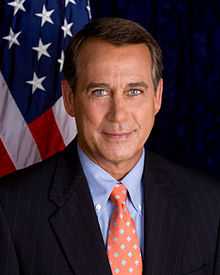
- Speaker: John Boehner (R)
Majority (Republican) leadership
- Majority Leader: Eric Cantor
- Majority Whip: Kevin McCarthy
- Majority Chief Deputy Whip: Peter Roskam
- Conference Chair: Jeb Hensarling
- Campaign Committee Chairman: Pete Sessions
- Policy Committee Chairman: Tom Price
- Conference Vice-Chair: Cathy McMorris Rodgers
- Conference Secretary: John Carter
Minority (Democratic) leadership
- Minority Leader: Nancy Pelosi
- Minority Whip: Steny Hoyer
- Assistant Democratic Leader: Jim Clyburn
- Senior Chief Deputy Minority Whip: John Lewis
- Chief Deputy Minority Whips: Maxine Waters, Jim Matheson, Ed Pastor, Jan Schakowsky, Joseph Crowley, Diana DeGette, G. K. Butterfield, Debbie Wasserman Schultz, Peter Welch
- Caucus Chairman: John B. Larson
- Caucus Vice-Chairman: Xavier Becerra
- Campaign Committee Chairman: Steve Israel
- Steering/Policy Committee Co-Chairs: Rosa DeLauro and George Miller[20]
- Organization, Study, and Review Chairman: Mike Capuano[21]
Members
For the first time in congressional history, over half its members were millionaires as of 2012; Democrats had a median net worth of $1.04 million, while the Republicans median was "almost exactly" $1 million.[22][23]
Senate
House of Representatives
- Alabama
- Alaska
- Arizona
- Arkansas
- California
- Colorado
- Connecticut
- Delaware
- Florida
- Georgia
- Hawaii
- Idaho
- Illinois
- Indiana
- Iowa
- Kansas
- Kentucky
- Louisiana
- Maine
- Maryland
- Massachusetts
- Michigan
- Minnesota
- Mississippi
- Missouri
- Montana
- Nebraska
- Nevada
- New Hampshire
- New Jersey
- New Mexico
- New York
- North Carolina
- North Dakota
- Ohio
- Oklahoma
- Oregon
- Pennsylvania
- Rhode Island
- South Carolina
- South Dakota
- Tennessee
- Texas
- Utah
- Vermont
- Virginia
- Washington
- West Virginia
- Wisconsin
- Wyoming
- Non-voting members
Changes in membership
Senate
| State (class) |
Vacator | Reason for change | Successor | Date of successor's formal installation |
|---|---|---|---|---|
| Nevada (1) |
John Ensign (R) |
Resigned May 3, 2011 due to an Ethics Committee investigation.[26] A successor was appointed April 27, 2011 to serve the remainder of the term that ends with this Congress. |
Dean Heller (R)[27] |
May 9, 2011[28] |
| Hawaii (3) |
Daniel Inouye (D) |
Died December 17, 2012 [29] A successor was appointed December 26, 2012 to serve until a special election is held to finish the term ending January 3, 2017. |
Brian Schatz (D) |
December 27, 2012 |
| South Carolina (3) |
Jim DeMint (R) |
Resigned January 1, 2013 to run the Heritage Foundation[30] A successor was appointed January 2, 2013 to serve until a special election is held to finish the term ending January 3, 2017. |
Tim Scott (R) |
January 2, 2013[31] |
House of Representatives
| District | Vacator | Reason for change | Successor | Date successor seated |
|---|---|---|---|---|
| New York 26th | Christopher Lee (R) |
Resigned February 9, 2011, due to a personal scandal.[32] A special election was held May 24, 2011.[33] |
Kathy Hochul (D) |
June 1, 2011 |
| California 36th | Jane Harman (D) |
Resigned February 28, 2011 to become the head of the Woodrow Wilson Center.[34] A special election was held July 12, 2011.[35] |
Janice Hahn (D) |
July 19, 2011 |
| Nevada 2nd | Dean Heller (R) |
Resigned May 9, 2011, when appointed to the Senate.[27] A special election was held September 13, 2011.[36] |
Mark Amodei (R) |
September 15, 2011 |
| New York 9th | Anthony Weiner (D) |
Resigned June 21, 2011, due to a personal scandal.[37] A special election was held September 13, 2011.[38] |
Bob Turner (R) |
September 15, 2011 |
| Oregon 1st | David Wu (D) |
Resigned August 3, 2011, due to a personal scandal. A special election was held January 31, 2012.[39] |
Suzanne Bonamici (D) |
February 7, 2012 |
| Arizona 8th | Gabrielle Giffords (D) |
Resigned January 25, 2012, to focus on recovery from 2011 Tucson Shooting.[40] A special election was held June 12, 2012.[41] |
Ron Barber (D) |
June 19, 2012 |
| New Jersey 10th | Donald M. Payne (D) |
Died March 6, 2012.[42] A special election was held November 6, 2012.[43] |
Donald M. Payne, Jr. (D) |
November 15, 2012 |
| Washington 1st | Jay Inslee (D) |
Resigned March 20, 2012 to focus on gubernatorial campaign.[44] A special election was held November 6, 2012.[45] |
Suzan DelBene (D) |
November 13, 2012 |
| Michigan 11th | Thaddeus McCotter (R) |
Resigned July 6, 2012 due to personal reasons.[46] A special election was held November 6, 2012.[47] |
David Curson (D) |
November 13, 2012 |
| Kentucky 4th | Geoff Davis (R) |
Resigned July 31, 2012 due to personal reasons.[48] A special election was held November 6, 2012[49] |
Thomas Massie (R) |
November 13, 2012 |
| California 18th | Dennis Cardoza (D) |
Resigned August 15, 2012 due to personal reasons.[50] | Vacant until the next Congress | |
| Illinois 2nd | Jesse Jackson, Jr. (D) |
Resigned November 21, 2012 due to personal scandal. | Vacant until the next Congress | |
| California 51st | Bob Filner (D) |
Resigned December 3, 2012 to become Mayor of San Diego | Vacant until the next Congress | |
| South Carolina 1st | Tim Scott (R) |
Resigned January 2, 2013 when appointed to the US Senate.[24] A special election was held May 7, 2013. |
Mark Sanford(R) | May 7, 2013 |
Committees
[ Section contents: Senate, House, Joint ]
Senate
House of Representatives
Joint appointments
- Deficit Reduction (Select)— Co-chairs: Rep. Jeb Hensarling (R), Sen. Patty Murray (D)
- Economic— Chair: Sen. Bob Casey (D), Ranking: Rep. Kevin Brady (R)
- Inaugural Ceremonies (Special)— Chair: Sen. Chuck Schumer (D), Ranking: Sen. Lamar Alexander (R)
- The Library— Chair: Sen. Chuck Schumer (D), Ranking: Rep. Gregg Harper (R)
- Printing— Chair: Rep. Gregg Harper (R), Ranking: Sen. Chuck Schumer (D)
- Taxation— Chair: Rep. Dave Camp (R), Ranking: Sen. Max Baucus (D)
Administrative officers
- Architect of the Capitol: Stephen T. Ayers
- Attending Physician of the United States Congress: Brian Monahan
Senate
- Chaplain: Barry C. Black
- Curator: Diane K. Skvarla
- Historian: Richard A. Baker
- Parliamentarian: Alan Frumin
- Secretary: Nancy Erickson
- Sergeant at Arms: Terrance W. Gainer
- Secretary for the Majority: Gary B. Myrick[51]
- Secretary for the Minority: David J. Schiappa
House of Representatives
- Chaplain: Daniel Coughlin (Roman Catholic), until April 14, 2011[52]
- Patrick J. Conroy (Roman Catholic), from May 25, 2011[53]
- Chief Administrative Officer: Daniel J. Strodel[52]
- Clerk: Karen L. Haas[52]
- Historian: Matthew Wasniewski[54]
- Parliamentarian: John V. Sullivan
- Reading Clerks: Susan Cole and Joseph Novotny
- Sergeant at Arms: Wilson Livingood, until January 17, 2012[52]
- Paul D. Irving from January 17, 2012[55]
- Inspector General: Theresa M. Grafenstine[56]
See also
Elections
- United States congressional elections, 2010 (elections held in advance of this Congress)
- United States congressional elections, 2012 (elections to be held during this Congress)
Membership lists
- List of freshman class members of the 112th United States Congress
- Members of the 112th United States Congress
References
- ↑ Pub.L. 111–289
- ↑ 2.0 2.1 Senate Calendar for January 20, 2012.
- ↑ Zeleny, Jeff (November 2, 2010). "G.O.P. Captures House, but Not Senate". New York Times. Retrieved November 3, 2010.
- ↑ Abramowitz, Alan (December 12, 2010). "Get ready for the most conservative Congress ever". Salon.com. Retrieved July 13, 2012.
- ↑ "The Polarization of the Congressional Parties". May 10, 2012.
- ↑ Yadron, Danny (January 6, 2011). "House Reads Constitution, Gets Civics Lesson". Wall Street Journal. Retrieved January 12, 2011.
- ↑ "Odyssey Dawn: Phase One Of Libya Military Intervention". The Epoch Times. 19 March 2011.
- ↑ "US troops complete their withdrawal from Iraq". Herald Sun. Australia. Retrieved 18 December 2011.
- ↑ Steinhauer, Jennifer (January 24, 2013). "Senator Unveils Bill to Limit Semiautomatic Arms". The New York Times. Retrieved January 28, 2013.
- ↑ Rowley, James (April 7, 2011). "U.S. Government Shutdown Threatens 800,000 People As Obama Seeks Solution". Bloomberg. Retrieved May 10, 2011.
- ↑ "US budget talks remain deadlocked". Al Jazeera. April 8, 2011. Retrieved May 10, 2011.
- ↑ 12.0 12.1 Davis, Julie Hirschfeld; Faler, Brian (April 9, 2011). "Wrangle Over U.S. Budget Compromise Defines Next Two Years' Fiscal Debate". Bloomberg. Retrieved May 10, 2011.
- ↑ "Pres. Obama and Congressional Leaders Reach Budget Deal". CSPAN. April 8, 2011. Retrieved May 10, 2011.
- ↑ Dodge, Catherine; Goldman, Julianna (April 8, 2011). "Long Government Shutdown Would Harm U.S. Economy, Hit Washington Hardest". Bloomberg. Retrieved May 10, 2011.
- ↑ "Editorial: Government shutdown survival guide". The Washington Times. April 7, 2011. Retrieved May 10, 2011.
- ↑ Goldman, Julianna (April 7, 2011). "Boehner Gets Paid While Soldiers Wait When Congress Shuts Down Government". Bloomberg. Retrieved May 10, 2011.
Members of Congress 'shouldn’t be getting paid, just like federal employees shouldn't be getting paid' during a shutdown, Boehner said today on ABC’s 'Good Morning America'
- ↑ "U.S. Senate, Democratic Committees". Retrieved May 5, 2011.
- ↑ "U.S. Senate Conference Secretaries". Retrieved May 5, 2011.
- ↑ 19.0 19.1 19.2 "U.S. Senate, Democratic Steering and Outreach Committee". Retrieved August 10, 2011.
- ↑ Office of the Speaker of the House (December 2, 2010). "Pelosi Announces Steering and Policy Committee Members". PR Newswire. Retrieved February 17, 2011.
- ↑ "Congressman Capuano's Update". FN Online. February 3, 2011. Retrieved February 16, 2011.
- ↑ "Millionaires' Club: For First Time, Most Lawmakers are Worth $1 Million-Plus". OpenSecrets Blog. The Center for Responsive Politics. January 9, 2014. Retrieved January 12, 2014.
- ↑ "Half of US Congressional politicians are millionaires". BBC News. January 10, 2014. Retrieved January 12, 2014.
- ↑ 24.0 24.1 2012 Congressional Record, Vol. 158, Page H7467 (December 30, 2012)
- ↑ Access Denied. NationalJournal.com. Retrieved on August 16, 2013.
- ↑ "Nevada Sen. John Ensign announces resignation". Politico. April 21, 2011.
- ↑ 27.0 27.1 Murray, Mark (April 27, 2011). "Sandoval appoints Heller to fill Ensign seat". NBC News.
- ↑ Heller in transition: One foot in House, one foot in Senate | Las Vegas Review-Journal. Lvrj.com (May 3, 2011). Retrieved on August 16, 2013.
- ↑ "Sen. Daniel Inouye dies of respiratory complications". MSN News. Associated Press. December 17, 2012.
- ↑ "South Carolina Republican US Sen. Jim DeMint resigning to take over at Heritage Foundation". The Washington Post. December 6, 2012. Retrieved December 6, 2012.
- ↑ Scott's appointment took effect January 2, 2013 upon his resignation from the House of Representatives; he took the oath of office on January 3, 2013.
- ↑ "Lee Resigns After Photos Surface". Political Wire. February 9, 2011.
- ↑ "Governor Cuomo Signs Bill to Ensure Military Voters are Treated Fairly in Special Elections, Calls Special Election in 26th Congressional District". Governor of New York's Press Office. March 9, 2011. Retrieved March 9, 2011.
- ↑ Allen, Mike; Cohen, Richard E. (February 7, 2011). "Rep. Jane Harman to resign from House". Politico.com. Retrieved February 17, 2011.
- ↑ "Governor Brown Issues Proclamation Declaring Special Election for 36th Congressional District". Governor of California Press Release. March 14, 2011. Retrieved March 14, 2011.
- ↑ "Sandoval Sets Fall Special to Fill Heller’s Seat". Roll Call. April 29, 2011. Retrieved April 29, 2011.
- ↑ Camia, Catalina (June 20, 2011). "Anthony Weiner Officially Steps Down Tuesday". USA Today. Retrieved June 21, 2011.
- ↑ "Governor Cuomo Sets Special Elections for September 13 to Coincide with Statewide Primary Day". Governor of New York's Press Office. July 1, 2011. Retrieved July 1, 2011.
- ↑ Freking, Kevin (August 4, 2011). "Wu notifies governor, speaker of resignation". Yahoo! News. Associated Press. Retrieved August 4, 2011.
- ↑ "Giffords resigns House seat to focus on recovery". Associated Press. January 25, 2012.
- ↑ Nowicki, Dan (January 27, 2012). "Brewer sets Giffords seat election dates". AZCentral.com. The Arizona Republic. Retrieved January 27, 2012.
- ↑ "U.S. Representative Donald Payne dead at 77". New Jersey Real. March 6, 2012.
- ↑ Livingston, Abby (March 30, 2012). "New Jersey: Special Election Dates For Payne Seat Set". Roll Call. Retrieved March 31, 2012.
- ↑ "Inslee resigning House seat for governor's race". Politico.com. March 10, 2012.
- ↑ Cornfield, Jerry (March 29, 2012). "Gregoire: Election in works to replace Inslee". HeraldNet. The Daily Herald. Retrieved March 31, 2012.
- ↑ "Rep. Thaddeus McCotter resigns from Congress". Abcnews.com. July 6, 2012.
- ↑ Toeplitz, Shira (July 10, 2012). "Michigan: Governor Calls Special Election for Thaddeus McCotter Seat". Retrieved July 11, 2012.
- ↑ "Statement from congressman geoff davis". July 31, 2012.
- ↑ Associated Press (August 17, 2012). "Beshear calls special election to replace Davis".
- ↑ Doyle, Michael (August 14, 2012). "Capitol Alert: Rep. Dennis Cardoza announces resignation". Retrieved August 14, 2012.
- ↑ S.Res. 5, 112th Congress
- ↑ 52.0 52.1 52.2 52.3 H.Res. 1, Electing officers of the House of Representatives, 112th Congress
- ↑ "VIDEO: Speaker Boehner Swears In Father Patrick J. Conroy as House Chaplain". May 25, 2011. Retrieved January 25, 2012.
- ↑ Matthew A. Wasniewski (Matt) - Congressional Staffer Salary Data. Legistorm.com. Retrieved on August 16, 2013.
- ↑ Sergeant at Arms-United States House of Representatives
- ↑ See: Rules of the House: "Other officers and officials"
Further reading
- Aftershock: The 112th Congress and Post-Crisis Asia by Edward Gresser and Daniel Twining (National Bureau of Asian Research, 2011)
External links
- Biographical Directory of the U.S. Congress
- Thomas Project at the Library of Congress
- Member Information, via U.S. House of Representatives
- Statistics and Lists, via U.S. Senate
- Congressional Directory: Main Page, Government Printing Office Online. Detailed listings of many aspects of current & previous memberships and sessions of Congress.
- Collected coverage on C-SPAN
| |||||||||||||||||||
